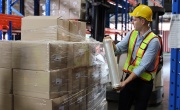The war on waste
Stavros Dimas, the current European Commissioner for the Environment, has taken a tough stance on climate change, citing the fight against it as 'a world way that will last for many years'. In an interview with Resource, the Greek politician explains how Europe is waging war for the environment
1 The EU is leading international efforts to combat climate change. Can you tell us about the initiatives you have helped to introduce?
Stepping up the fight against climate change is one of the main priorities of the European Commission (EC). Since 2005, we have been developing our ideas for the global action that will be needed after 2012, when the Kyoto Protocol’s
emission targets expire. All EU leaders have endorsed the so-called ‘20-20-20’ targets – a cut of at least 20 per cent in our greenhouse gas emissions, rising to 30 per cent in the context of a satisfactory international agreement, a 20 per cent market share for renewable energy and a 20 per cent reduction in energy intensity by improving energy efficiency. Europe is the only region of the world to have such ambitious targets and the measures to fulfil them.
2 You were named European Commissioner of the year for your efforts in steering plans to combat climate change last year. What are your plans for this year?
Our top priority this year is to ensure that the international community reaches a strong agreement on post-2012
action at the Copenhagen conference in December.
3 You have written a letter to President Obama in which you call on him to commit to tackling climate change. Has he responded to you?
It was an open letter, and as such does not require a personal response. But in a way President Obama has indeed responded through public statements marking a sea change from the approach of his predecessor. At last there is a serious move in the US towards taking policy action at home, which is crucial if other countries are going to be persuaded to take action too.
4 Do you think the US will become the new leader in environmental policies and ambitions?
The new administration is certainly showing itself to be proactive. Climate leadership by the US and by all developed countries is needed to set an example to the developing world and convince them to limit their emissions growth. For many years the EU has led the way, but now it is time for the rest of the industrialised world to step up and share leadership with us.
5 Some people have suggested that the 20 per cent target for renewables isn’t realistic. How does the EC plan to get member states to deliver on this commitment? Which technologies do you think will play the major role?
It’s important to remember that the 20 per cent target was agreed by the European Parliament and Council in December 2008. Every member state – including the UK – voted in favour of the directive.
Member states are beginning to focus on the benefits and consider the potential for creating new jobs and boosting the economy. Our latest study shows that reaching the 20 per cent target will generate some 600,000 new jobs in the renewables industry in the EU, up from the 1.4 million people employed by the sector today. Together with the incentive of the member states, the revised Emissions Trading System will favour new investments in renewable energies.
Photovoltaics (PV) and wind power are the fastest growing technologies in relative terms. The industry is committed, and is aiming to reach 12 per cent (PV) and 15 per cent (wind) of EU electricity in 2020. In absolute terms, biomass, wind (onshore and offshore) and large hydro are likely to have the biggest shares in 2020.
6 Which member state is leading the way in sustainable waste management in Europe and why? How do you think the UK is doing?
It’s difficult to give an overall assessment of sustainable waste management, because a great deal depends on the waste stream in question.
But if we consider the leaders to be member states with high waste collection and recycling rates, and the laggards to be those with a high rate of infringement cases, the top performers in terms of packaging recycling would be Belgium, the Czech Republic, Germany, Luxembourg and Austria, and the leaders in terms of packaging recovery Belgium, Denmark, and Luxembourg. Belgium, Germany and the Netherlands lead the field in end-of-life vehicle recycling and recovery, and Denmark, Luxembourg, the Netherlands and Austria are doing well with WEEE collection and recycling. The country with the highest number of infringement cases related to waste legislation is Italy.
The UK has met the prescribed recycling and recovery targets for packaging, but it missed the recovery target for end-of-life vehicles. There are five infringement cases open against the UK in relation to waste legislation at the moment, placing the country somewhere in the middle, between the top performers and the laggards.
7 The Waste Framework Directive makes prevention a key part of the EU’s strategy for waste management and resource efficiency. Do you have a view on effective mechanisms and policy for achieving this aim?
The volume of waste generated in the European Union is constantly on the rise. This waste has negative effects on the health of European citizens and the environment due to the emissions it creates and the pollution that it releases into the air, water and soils.
This is why waste management and more particularly waste prevention are at the top of the EC’s priorities. The directive contains a list of examples of waste prevention measures that member states could use in their waste and resource management policies. It also requires them to prepare national waste prevention programmes. We will assist the member states in preparing these programmes by developing guidance and exchange of best practice in waste prevention. The commission is also going to elaborate waste prevention indicators, to help measure and assess the effectiveness of waste prevention measures adopted by the member states.
In a broader context of resource efficiency, which basically depends on reduction of material use, reuse and recycling, the commission is looking into indicators such as resource productivity that can measure the resource efficiency of an economy. The bigger issue is of course not only in terms of material use but what the environmental impacts are and how these can be reduced.
8 The waste industry has been slow to respond to the current challenge of resource efficiency. To encourage progress, will the EC consider legally distinguishing waste from materials that are separated at source (and delivered to other commercial and industrial users as a resource) in a way that means these materials are exempt from waste regulations?
This is indeed one of our priorities. The issue was discussed with the member states at a Technical Adaptation Committee meeting in March. We are making good progress in drawing up ‘end-of-waste criteria’ for several waste streams. The criteria will come in the form of technical specifications that facilitate decisions on when waste is sufficiently recovered to cease being considered waste. These ‘secondary’ raw materials will be considered as products, and will no longer fall under the waste legislation. Although that does mean that product-related legislation (including REACH) would apply.
9 What is your view on commingled collections of recyclables?
Member states are obliged to instigate separate collection of waste provided it is technically, environmentally and economically practicable, so that the appropriate quality standards for the relevant recycling sectors are met. Provided that commingled collection of paper, metal, plastics, glass and other recyclable materials is followed by their subsequent separation, the appropriate quality standards are met and high quality recycling is being promoted, member states can continue the practice.
10 Do you think there should be tighter controls on the producers of industrial waste, even if it affects competitiveness in the global marketplace?
The polluter pays principle is an important aspect of the EU Treaty, and that’s why it’s there in the revised Waste Framework Directive. Producer responsibility is one aspect of the principle. So the revised Directive has a new article about extended producer responsibility, and it will also form part of the revised WEEE Directive too. But as you know, effective waste treatment doesn’t just mean responsibilities and costs. There are many business benefits too, including creating a level playing field which helps competitiveness.
11 How important is it that the EC prosecutes member states that fail to fulfil their obligations?
We take no pleasure in prosecuting member states because it means something has gone wrong. We always prefer dialogue, but sometimes we have no choice but to ask the court to order them to comply. In the end, it is the EC’s job to ensure that member states implement the rules and commitments that they have democratically agreed in the council.
12 Finally, what is the best thing about your job? What’s the hardest part? And what’s your greatest ambition?
One thing that has given me tremendous satisfaction over the past few years is the knowledge that environmental concerns are top on the commission’s agenda. This in turn has given a boost to environmental policies at the national level. The most frustrating thing is hearing people say that environmental protection is a luxury. That is transparently false: Our life on Earth depends on goods and services that the environment provides. My greatest ambition would
be sealing the deal in Copenhagen. That would be a tremendous achievement.




